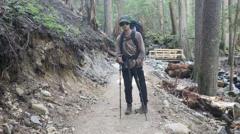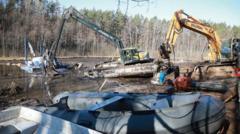A 20-year-old hiker's incredible journey of resilience highlights the importance of preparation and survival skills in adverse conditions.
Missing Hiker Survives 5 Weeks in Harsh Wilderness of British Columbia

Missing Hiker Survives 5 Weeks in Harsh Wilderness of British Columbia
Rescued after enduring extreme conditions, Sam Benastick’s story is a testament to survival against all odds.
Sam Benastick, a 20-year-old hiker, has been found alive after being stranded in the wilderness of British Columbia for over five weeks. Reported missing on October 19, he had embarked on a 10-day fishing and hiking excursion in the rugged terrain of Redfern-Keily Park but failed to return. Despite extensive search efforts by authorities, which were suspended in late October due to the harsh weather, Mr. Benastick's survival against the odds is remarkable.
Temperatures during his ordeal plummeted to around -20°C (-4°F), and Mr. Benastick faced serious challenges in locating food and shelter. Rescuers eventually found him on Tuesday, thanks to two individuals who recognized him while they were working along the Redfern Lake trail. RCMP Cpl. Madonna Saunderson expressed profound relief at the outcome, stating, "We're very grateful. The family is thrilled," especially given the possibility of a more tragic end.
Mr. Benastick reported that he initially stayed in his car for a couple of days before he set out on foot, ultimately camping alongside a creek for approximately 10 to 15 days. Equipped only with a tarp, a backpack, and limited camping supplies, he was forced to improvise in the wilderness, even cutting up his sleeping bag to keep warm as temperatures worsened and snow began to fall.
Search manager Adam Smith from Prince George Search and Rescue noted, "Those are very difficult conditions for anyone to survive in, particularly with such limited resources." He highlighted the complexity of the terrain, which included steep cliffs and glaciated areas, complicating rescue operations that involved both ground and air teams from the Canadian Rangers and RCMP.
Details of Mr. Benastick's health remain largely undisclosed, but local innkeeper Mike Reid reported that he was in "rough shape" upon rescue. Before disappearing, he was last seen at a trailhead near Redfern Lake. As search teams assess the situation, Mr. Smith expressed a deep interest in understanding the specifics of Mr. Benastick's experience to refine future rescue protocols in similar wilderness areas.
Temperatures during his ordeal plummeted to around -20°C (-4°F), and Mr. Benastick faced serious challenges in locating food and shelter. Rescuers eventually found him on Tuesday, thanks to two individuals who recognized him while they were working along the Redfern Lake trail. RCMP Cpl. Madonna Saunderson expressed profound relief at the outcome, stating, "We're very grateful. The family is thrilled," especially given the possibility of a more tragic end.
Mr. Benastick reported that he initially stayed in his car for a couple of days before he set out on foot, ultimately camping alongside a creek for approximately 10 to 15 days. Equipped only with a tarp, a backpack, and limited camping supplies, he was forced to improvise in the wilderness, even cutting up his sleeping bag to keep warm as temperatures worsened and snow began to fall.
Search manager Adam Smith from Prince George Search and Rescue noted, "Those are very difficult conditions for anyone to survive in, particularly with such limited resources." He highlighted the complexity of the terrain, which included steep cliffs and glaciated areas, complicating rescue operations that involved both ground and air teams from the Canadian Rangers and RCMP.
Details of Mr. Benastick's health remain largely undisclosed, but local innkeeper Mike Reid reported that he was in "rough shape" upon rescue. Before disappearing, he was last seen at a trailhead near Redfern Lake. As search teams assess the situation, Mr. Smith expressed a deep interest in understanding the specifics of Mr. Benastick's experience to refine future rescue protocols in similar wilderness areas.




















